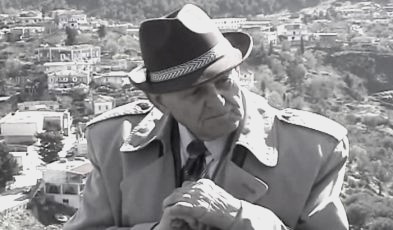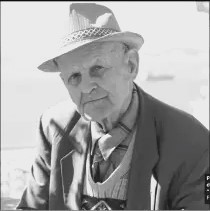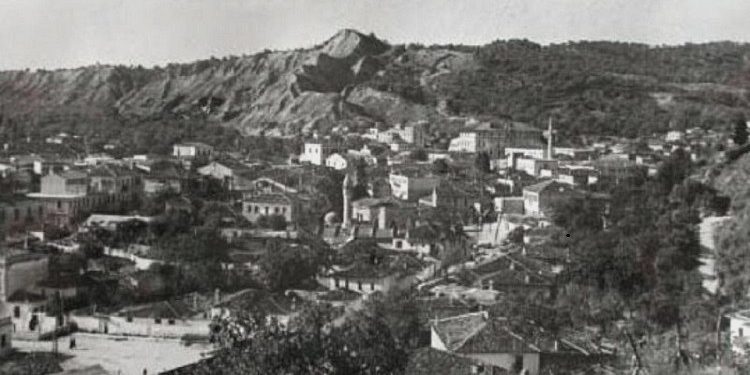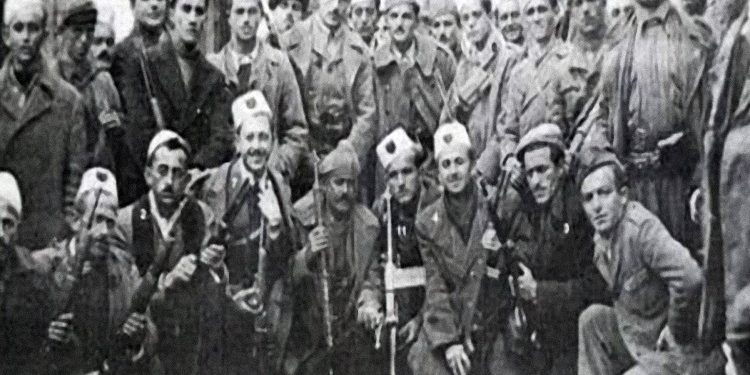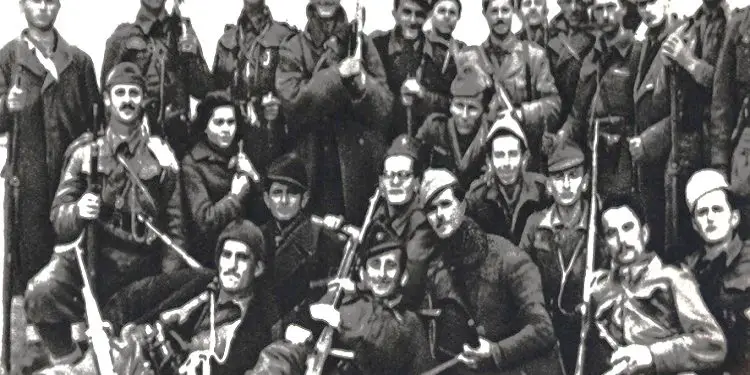By Petrit A. Velaj
Part One
Memorie.al / During the years of World War II, the waves of the Anti-Fascist War swept us away without us realizing it. We were schoolmates, like city boys, me, Bajram Tushi, Hajredin Bylyshi, Hiqmet Buzi, Mumin Selami (Kallarat). Amidst dreams and desires of the Romanization of literature. With these friends of mine, I have many memories. Our parents, our mothers, honest and generous people. A patriotic mother, mother Tina of Tol Arap, the well-known patriot, gathered us around her like a nest of birds. She was the mother of my childhood friend, whom we called: “the flower of Vlorë youth”, Vllas Arap. I think Mumin Kallarati gave this epithet to Vllas. I associated with every friend and comrade who was honest and sincere.
This united us in our society with our peers: Hazis Sharra, Qemal Xhyheri, Xhemil Beqo, etc. Although our opinions were different, we went together to picnics, play games and go to the cinema. A meeting at Lef Sallata’s house. Suddenly, politicized thoughts erupted in our society. The debate flared up with the young revolutionary, Kastriot Muço. He was an honest man. After four or five days, Kastriot said to me: “Petrit, when are you going to hold the youth meeting in the Çerekçie neighborhood? In the city’s activity, you were elected responsible for the neighborhood’s youth group”. After a few days, we organized the youth meeting in the “Çerekçie” neighborhood. At this meeting, communist views with Slavic mentalities were expressed.
Kastriot said that the inspirers of revolutionary work in Albania were a certain Dushan and Miladin, who would come to Vlora themselves to meet us and exchange ideas with us. When I found out that they were Yugoslavs, I stood up in rebellion and said: “If we are to be led by Slavs, I do not agree with this kind of policy”! We parted ways with Kastrioti coldly. However, until the fall of 1942, I was wholeheartedly an activist of the Anti-Fascist War among the youth of Vlora. Early one morning, I met my friend, Bajram Tushe, who was part of another group. We talked for two or three hours on foot, walking through the streets of the city. Finally, Bajram said to me: “Petro, I also have these thoughts that you have.” Walking from his house, in front of Selim Beqo’s inn, he asked for my watch. He had a job and had to be punctual.
I had given it to him other times, but this time because I was bored, I took it from his hand and gave it to him: We hugged and parted ways. Bajram’s words rang in my ears: “The sky will open from the clouds and we will see each other better…”! That night, “Topanaja” woke up from the explosions, bullets and flames. It was a night of tragedy for the youth of Vlorë. The next morning, over 2000 young men and women, went to the place where the boys of the youth of Vlorë had been killed. The Italian bullets were still in the walls of the reed house. I approached closer, among the crowd, but what did I see?! The lying bodies of the “lions” of “Topanaja”. The undried blood of Hiqmet, Haredin, Bajram and Mumin. I took 15-year-old Hiqmet Buzi in my arms. So did the other friends. We took them to the hill of “Budak”. I held Bajram’s hand for the last time. The clock was ticking, while Bajram’s heart had stopped.
Someone sang a song like the old ones. The place was surrounded by hundreds of Italian militias, surrounded by their mercenaries. We buried them all with songs. We gathered and made a decision. Some young people were tasked with finding the “spy” who reported them to the Italians. With the song of our youth in their mouths. “Come, gather here”, they gathered in the alleys and streets of Vlora in front of the Italian consulate. There we asked General Xanini to come out on the balcony. When he came out in front of the youth of Vlora, we asked him to release our imprisoned comrades. Xanini, from the balcony of the consulate, facing the courtyard of the “Karabash” prison, ordered the Italian carabinieri to release sixty or so prisoners after beating us well. We dispersed to our homes. The next day, Qimo Kocani and Polo Bezhani, one from Bregu i Detit and the other from Labova, asked me to meet. We met by the sea, at the Old Beach.
In this meeting, which lasted 3-4 hours, I defended the idea of starting a war and then dividing the youth according to ideological and political views, while they insisted that this be done without starting a war. While they were talking, my classmate Popua sang a song that was starting to spread at that time. I remember the four verses of the song: “In the fields of the bey, while they were harvesting grass/ a voice was heard shouting, o proletarians…”! And Polua accompanied the song with his words: “We must separate, each one find his own place.” Qimo Kocani, seeing my attitude, said to me: “Petro, be with us, otherwise you will pay dearly”! I stood there for a moment, then I said to them: “We are friends and brothers. It is good to love each other and Albania, as we have loved it until now, after all, if we are parting, at least to love Albania, as we have loved it until today…”!
Year 1943. I was at the house of Rexhep and Memisha Sula, in Brataj. There I also found Dr. Brahim Dervish, my fellow villager. From evening until morning, we quarreled with words, we remained without dinner. In the morning, as we were parting, I said to him: “Doctor, light a candle for the life of Hysni Kapos, because you are a ‘Pocket’. You have been self-critical, from Konispol to Mallakastër”. My anger stemmed from the fact that his father, Hamdi Dervishi, as well as Hydai Muftiu, ended their lives in shame as fascist spies in 1920. A few days later, I had an illegal meeting with Qani Shena. He was known among us by the nickname “Xharxhanezi”. The conversation took place in the village of Gjorm, on a rock, on the side of the Shushica River. We ended with a compromise: Qani gave the “National Front” in Vlora the right. The two main inspirers were: Professor Selahedin Peshkëpia, and Professor Tasin Jonuzi. The intelligence and personality of Prof. Tasin were special.
In the meeting that took place in the Kreshpanjak family’s house, in April 1943, in the “Topana” neighborhood, Skënder Muço, Tahir Hoxha, Yzeir Ismaili, Bego Gjozeneli, Tasin Jonuzi, Isuf Luzi, Mehmet Alemi, Zako Mezini also participated. On the part of the nationalist youth, there was me, Gëzim Dalani, Murat Kokoshi, Hazis Sharra, Nazif Çala, Nasho Bezhani, Xhemil Beqo, Harito Bezhani, Abdurraham Kreshpa, Selahedin Velaj, Shaban Xhyheri, Hajrullah Selfo, Qemal Xhyheri, who had also participated in the first nucleus of the nationalist youth, in the house of Selim Beqo. This generation, and others who may have escaped my memory, created the youth cell of the “National Front” for Vlora. I was elected secretary, commander Hazis Sharra, and sub-commanders Qemal Xhyheri and Nazif Çala. While for the military side, commissar: Shaban Xhyheri, Gëzim Dalani and 14-year-old, Nasho Bezhani.
After this meeting, we all went underground. On July 7, 1943, the general meeting of the “Ballit Kombëtar” of Vlora was held. The meeting was held at “Rrepet e Ismail Qemalit”, in Mesaplik on the Vlora River. Mit’hat Frashëri, Hysni Lepenica, Skënder Muço and Hasan Dosti came there. From the Youth side, we were represented by: Tasim Jonuzi, Selahedin Peshkëpia and myself. Each village was represented by its own cheta. I can see the Mesaplik field before my eyes, which that day held over 3000 people. At this time, across the Shushica River, where there was an old spring, Bedri Spahiu, Arshi Xhindi, Shemsi Totozani, and Maman Saliu had arrived, intending to disrupt the meeting of the Balli Kombëtar. Someone from our side wanted to shoot them with a machine gun. As soon as I found out, I informed the commander of the “Balli” detachment of Kanine, Mr. Tasim Murati, about this action.
He reported to Mit’hat Frashëri, who gave the order not to carry out any action with weapons.
The main speech on behalf of the Central Committee of the “Balli Kombëtar” was delivered by lawyer Skënder Muço. His words were etched in my mind: “Victory without risk is triumph without glory”! He stressed the need to organize nationalist and patriotic forces, in a frontal manner in the fight against the Italian fascists. This idea, in his own discussion, was even better explained by Professor Tahir Hoxha, a serious, idealistic and patriotic man of our times, who enjoyed great respect among us. Wherever he had been as a teacher, in every school, he inspired the youth with Albanian patriotism. After him, Hysni Lepenica took the floor, who explained the topic: “On the military formations of the nationalist forces of the Vlora district”. He focused on the enemy’s striking points and the best defensive organization of our forces. Hysni Lepenica was a large and handsome man. When he spoke, we all listened intently, because in addition to his reputation, he also had a special military inclination.
The regions of Labëria and Topalltia had known him closely. Authority and popularity were beautifully combined in his figure. You could see him when he sat and talked with the villagers of Labëria and other areas. He would keep the conversation light-hearted and at the end he would close with a popular proverb, which would let everyone understand his position and place. In the war of Gjorm against the Italian fascists, Hysni Lepenica was called; “The Hero of Gjorm”. Even in these moments when I am writing these notes, I am reminded of the verses of the poet from Vlora, Kudrejt Kokoshi, who, inspired by the popularity of Hysni Lepenica, by the bravery he showed by laying the fascist colonel, Klementin, on the ground in the battle of Gjorm, says with full cadence: “The impetuous Hero of Gjorm/ a warrior at first/ in resistance like a granite rock/ and in war like a suicide bomber…”!
Somewhere else, my thoughts are stirred by the portrayal that Kudret brother has made of the other apostle of nationalism, the sweet-mouthed lawyer and orator Skënder Muço, in his verses: “Yes Skënder, Skëndo brother/ who with a warm mind and arm/ knows how beautiful, you, o Mother/ loves you compassionately…”! I still have the portrait of this giant of our mountains alive, in my eyes and in my heart. I was very young, when after the report of Professor Tasin Jonuzi, on the topic: “Mobilization of the youth of Vlorë, against the enemies of the country”, I was invited to speak a few words. I once cast my eyes around the mountains of Vlorë Albanianism, in that magnificent assembly. In my speech, in a decisive and determined manner, I called on the youth of Vlorë, for unity and brotherhood, in the fight against the enemies of the country. I swore before that assembly, that as the great idealist, Mid’hat Frashëri, said, “Our Party is Albania”.
People looked at me with the twinkle of their eye, when I said with youthful fire, that I would remain loyal to Albania and would shed even the last drop of blood, for the Albanian land. I was too young before the manhood of Labëria, before the people with a burden of mind, that the Mesaplik Field, near the turnips of Ismail Bey, carried on their shoulders. After speaking there, the verses of our great Renaissance men came to my mind like a song with Labe polyphony to the lips: “Whoever sings for the Fatherland, does not say there is a dek, but says there is a le”…! At that moment, when Mit’hat Frashëri, Abdyl’s son, the apostle of Albanianism, took the floor, with tears in his eyes he addressed us all. It seemed to me as if he had put his arms around our shoulders and was speaking to us: “Brothers! Albania is small. We are few Albanians. The enemies are many. They have a grudge against us. The strongest weapon of the Albanian in these moments is unity and brotherhood. Only in this way can we face the evils of the enemy and the evils of Yunnan. Only in this way will we make Albania ours, with Kosovo and Chameria. The homeland calls us to love each other even more…”!
White-bearded Mit’hat Frashëri, a high figure of Albanian patriotism, Chairman of the Patriotic Club of Thessaloniki, director of the newspaper “Liria”, chairman of the Albanian government delegation with Fishta in France. While he was speaking, the wind of Çipin caressed his white hair, and the figure of this great man grew before us. The onomatopoeia of centuries-old turnips gave its own symphony, as if it were lecturing a new song about the Nightingales and Ismail Qemali. Albanian idealism appeared among the mountains of Labëria, with its own epic. There, faith in victory over enemies mixed with the dreams of the martyrs of Albania. Professor Isuf Luzi, a participant in the Rruzhdije war, in Mallakastër, March 1943, commander of the Selenica war, together with Hazis Çami, also spoke. Amid the bullets of the Selenica battle, he addressed the Italian carabinieri in Italian: “Surrender, you devourers of the Fatherland and of the freedom of the peoples.” At this time, the Kuksi officer, Tasin Spahiu, who was a carabinieri with the Italians, threw down his weapons and surrendered.
After him, 400 Italians rushed to the flooded Vjosa River, where the bloody battle took place. The bravery of the Albanian fighters gave the victory of Selenica. After that, the fighters under the command of Isuf Luzi, set off for Lepenica…! At this time, while Isuf Luzi was talking about the battle of Rruzhdije and Selenica, M.S., accompanied by 14 partisans from Vranishti, with the Albanian flag with a star, and dressed in English clothes, crossed the Shushica River, throwing slogans to sabotage this noble gathering. As soon as the meeting ended, he asked to protest, going out through the nationalist fighters, to the other side of the field, from the side of the villages of Mesaplik. Meanwhile, Reiz Shero Agaj, appealed to all those present: “You closed the rally well with the call; Down with fascism, but I would also like to call; Down with communism.”
That night we dispersed to the houses of the villagers of Mesaplik, Vlora and Bolena. I, together with Professor Tasin Jonuzi and Selahedin Peshkëpinë, went to stay with the family of Hajredin Meta. It was a family with fighting traditions, since the anti-Ottoman uprisings, the Vlora war in 1920, etc. That night, amidst conversations about the bravery of the fighters of these parts, from Cane Myftari to Zigur Lelua, we had a good time. In the morning, when the brow of the Çipini mountain was beginning to lighten, they sent us word to gather in a meadow. Mit’hat Frashëri greeted us there. We were very happy when the monapat also hung for us, professor Wan Filipi, professor Hamdi Rrapi, lawyer Fatosh Kokoshi, Maliq Koshena, Galip Haxhiu, professor Yzeir Ismaili, Mihal Peço, Harito Bezhani, and the patriot lab, Xhemil Meço.
Mit’hat Frashëri was accompanied by the brave commanders; Hamdi Çeprrati, Muço Çeprrati, Hasan Hyso, Hysen Çobo, Tasim Murati, deputy commander Bajram Selmani, together with the commissar of the Kanina platoon, Refit Toro and Dilaver Asllani. They arrived late, as the Italian forces had blocked the Dushkut Pass above Kotë and thus their arrival was made illegally, by road and other paths. After the words of Mr. Mit’hat Frashëri, Xhemil Meço invited us for a working breakfast at home. His house was near the dairy, a two-story house with stone gazebos, with large rooms. One room could accommodate 60-70 men. While eating breakfast, the commission for the distribution of fighters to the villages of other provinces was also created. Sadik Çoban, Bego Gjozeneli, Novruz Smaili and Estref Meço, and I were assigned to go to the area: Bashaj, Matogjin and Beu. The purpose of our activity was to increase the ranks of fighters of the “National Front” and organize the frontal fight against the Italian fascists.
During the two weeks that we stayed in Matogjin, we had as our base the house of Qemal Xhelo, while in Bashaj the house of the charming and humorous old man, Shaban Mahili. Qemal Xhelua had a one-story house, in the Labëria style, at the foot of the Vermiku rock, surrounded by white pine trees. The waterfalls that flowed from the rock added to the charm of that house. I became accustomed, during the days of my stay there, to go and eat my bread by the water’s edge. One day we held a meeting at Bashaj’s school. The meeting was led by Feti Bora, and suddenly some communists from the village and the province came to the meeting and sat down as if from the bottom. Among them I recognized Dr. Brahim Dervish and a couple of ‘normalists’ from Matogjini. In the course of the conversation, a fierce debate began. There I heard again that a certain Tito, who leads the war in Yugoslavia, had told us that: “Albania cannot even exist without Yugoslavia”, and for this purpose, he had sent Meladin and Dushan to our country.
Unwillingly, I stood up and spoke. In my words, I remember saying that; “we Albanians must fight the war in Albania”. One of the ‘normalist’ students of Matogjini opposed me. In the above, he said that; “even if we communists fail, the EAM of Greece and the Titua of Yugoslavia will intervene to suppress you of the ‘Ball’”! The next day we gathered at the Qafa Mosque of Matogjini. The tribe of Shevqet Musaraj also participated there, who did not hesitate to openly express their views. They called us: “collaborators of the Italians”. We responded sternly, but not with their hot-temperedness and threats. After three or four days, on August 2, 1943, they communicated to us the meeting of Mukje, where the “Balli Kombëtar” and the Communist Party had participated. From the “Ball Kombëtar” side, there were Mit’hat Frashëri, Isuf Luzi, Thoma Ollorogai, from the communists: Ymer Dishnica, Mustafa Gjinishi.
From the National Liberation Council, the Chairman of Legality Abaz Kupi. Mukja warmed our hearts, for unity and brotherhood with each other. Wherever we were in villages and cities, partisans and ballistas embraced each other. For 37 consecutive days, when we met, we shouted: “Long live Mukja”. But, after some time, we see how the communists had lowered their eyebrows. Surprised, we asked for several meetings with them. One answer came to us that: “why does the ‘Ball Kombëtar’ want Ethnic Albania, now is not the time for Kosovo and Chameria”?! Some others told us that; these problems will be solved, but after the war. “That’s what Meladin said”, – they said. That’s what the EAM general, Markos, said. There were even those who told us that; even the star-studded flag was the flag of Skanderbeg. Rumors and debates began to spread that; among the “National Front”, there are many daughters of beys and agallars. Often, during the Second World War, we asked ourselves the question: What happened to Mukje? Why did it happen like this?! Memorie.al




